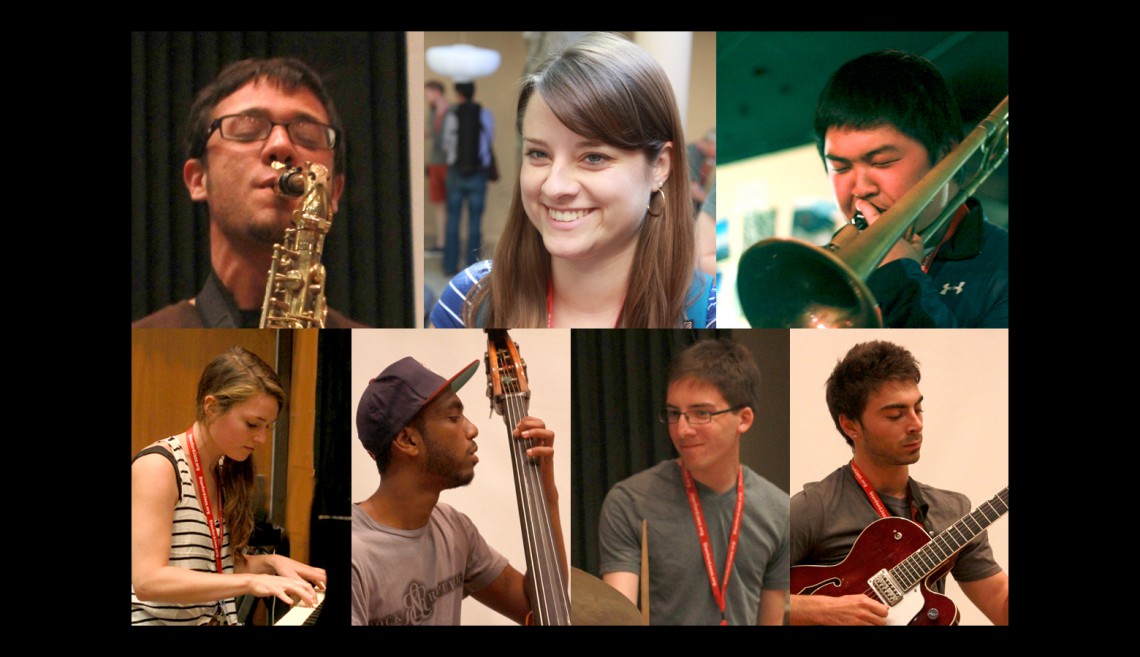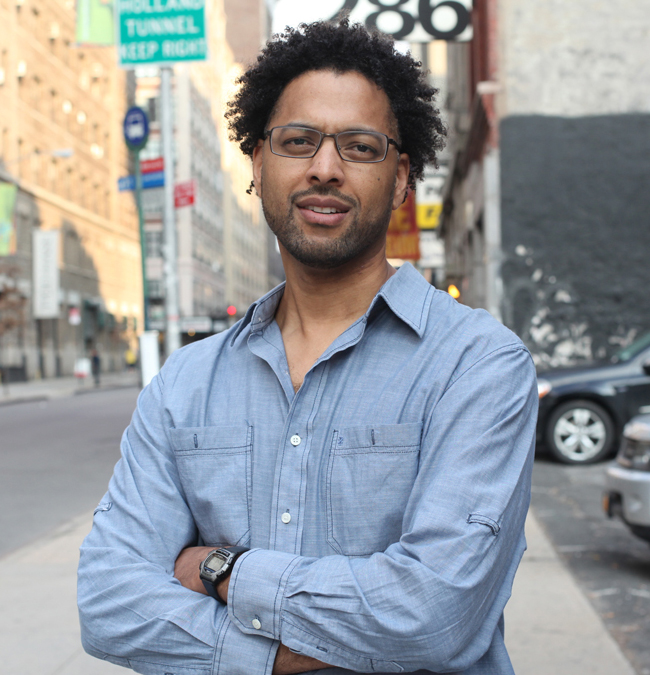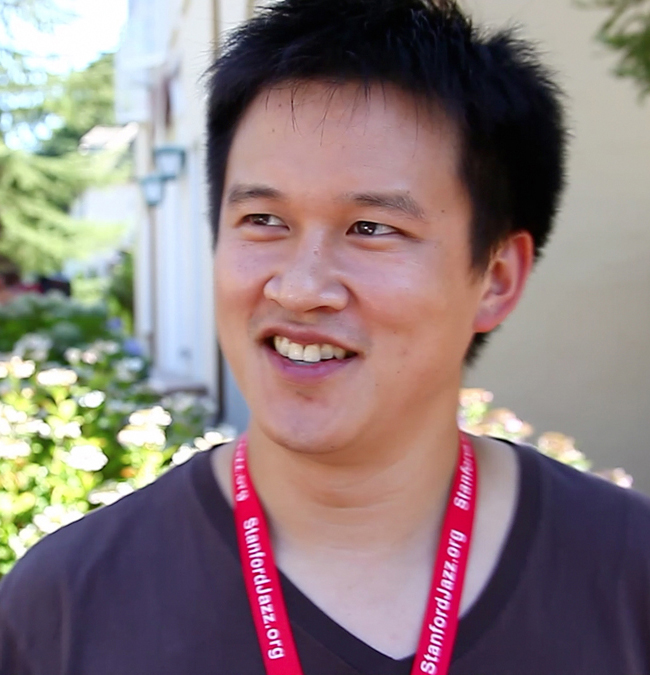
My Three Weeks with the Workshop (Part 1 of 2)
This piece is the second in a series by guest music critic Tyler Brooks. It is part one of a two-part story on the Stanford Jazz Workshop and Festival.
I had the privilege of covering the 2013 Summer Jazz Workshop and Festival (SJW/F) for its duration – following the international cast of students, staff and faculty who make up the immersive three-week world of summer jazz camp at Stanford.
The first two weeks of the Workshop (part one of my two-part SJW/F coverage) are usually attended by beginner-to-intermediate jazz students and taught by faculty of all different musical backgrounds and matchless musical ability. The SJW/F programs and events took place at and between Stanford’s music facilities, namely Braun Music Center, the Stanford Coffee House (or “CoHo”) stage, Campbell Recital Hall, Dinkelspiel Auditorium and Bing Concert Hall.
I also had the fortune of attending the majority of concerts that were part of the Festival in those three weeks. The first two weeks included Andy Milne and New Friends, Victor Lin’s Jazz in the Magic Kingdom, Ruth Davies’ Blues Night, the Calvin Keys Quartet concert, the SJW Faculty’s I Remember Dave Brubeck concert, the SJW Mentor Fellows Program culmination concert, and the two Jazz Camp Showcase Fridays.
Among these, three concerts in particular showed me what the SJW/F world was really all about.
Astronomy with Andy Milne
The quintet for the Andy Milne and New Friends concert featured pianist and lead composer/arranger Andy Milne, drummer/percussionist Tupac Mantilla, trumpeter Mike Olmos, bassist Todd Sickafoose and saxophonist Ben Flocks. All ensemble members were also faculty, having varying teaching commitments in the Workshop throughout the three weeks.
Needless to say, the New Friends concert hinged on the edge of a lucid dream. You wouldn’t have been able to fathom that that Tuesday night was the first time this ensemble performed together, let alone that they had had only one rehearsal – on the previous day.

Upon entering the room, you see Milne’s prepared piano apparatus and Mantilla’s mind-boggling percussion setup and wonder what this ecology of instruments could be foreshadowing for the first SJW/F moment. Minutes later, Milne and Mantilla entered the stage and started into a hypnotic 7/8 duet of energetic body percussion and prepared piano murmurs, hovering in that twilight between mezzo-piano and mezzo-forte. Sickafoose then tiptoed out, situated himself, and bowed moody, staticky groans on his bass, to which Flocks and Olmos then entered to herald the beginning of Milne’s brilliant original, “The Temperament of the Juggler.”
Moments like this happened all night. Only after a few songs did audience members actually dare to applaud, as they were so possessed by the synchrony and the sheer otherworldliness of this ensemble’s compositions and arrangements.
And try as you might, you could not take your eyes and ears off Milne. From shimmery, carouseling tunes like “Enigma Man” to pensive, near-transcendental tunes like “Vertical on Opening Night,” Milne’s playing quickly ruled out any doubt that he’s one of the best piano players of this time. In a word, Milne is astronomy put to jazz. Through indecipherably crafted solos, you follow him into uncharted harmonic territory and discover the kinds of colors, textures, scents and flavors that jazz often proclaims to be looking for. It makes sense that Milne be recognized as heir to the legacies of Oscar Peterson and Herbie Hancock, as he is capable of uncovering a whole new galaxy in millennial post-bop piano himself.
And if Milne was lead pilot through the night’s harmonic otherworlds, Mantilla was the humble co-pilot through the night’s rhythmic brotherworlds. Mantilla was a force from his Afro-Latin–corrected drum kit through to his percussion shrine that included wind chimes and a steel bucket full of water. But even when he abandoned this apparatus, he still amazed listeners. Complete in his embodiment of pulse and polyrhythm, he didn’t even need drums to keep Olmos afire in their body-percussion/trumpet feature. Instead, he clapped and stomped a rhythm section out himself.
Many songs in the set were pulled from Milne’s original soundtrack project with Star Trek legend William Shatner in the 2011 documentary The Captains. The film followed Shatner and interviews with other “captains” about their lives before, during and after their stints in the hit franchise. Every time Milne introduced a soundtrack-inspired piece, he transposed the ensemble’s musical offerings that night into an interesting key. That is, these were not just mere jazz songs and solos, but also extended stories of beings from worlds both real and fictional, terrestrial and extraterrestrial.
By the time the concert ended with “Vertical on Opening Night,” I felt like I was part of a special feature – a special feature exclusive to SJW/F audiences, that is. The sound of audience members breathing quietly or brushing against their seats fell right in with Milne’s and Sickafoose’s pedal-tones and Mantilla’s breaths dissipating into soft taps on his cymbals. By the time the song ended, I was certain that we were all on an entirely different planet.
Two nights later, the magic continued.
Live Pixar with Victor Lin
Having witnessed him in action countless times throughout my three weeks at SJW/F, I now know: If Victor Lin is leading your session, you’re going to have fun.
“Jazz in the Magic Kingdom” was the star 15-year faculty pianist/violinist’s grand SJW/F showcase of jazz interpretations of classic Disney songs. That Thursday fell into a tradition Lin has been perfecting in recent years of showcasing his jazz interpretations of cult classics at the Festival. Joining him were several SJW colleagues, many whom he employs as faculty at his Calhoun School program in New York, which Lin claims was inspired by “everything I was doing at the Workshop just expanded into a yearlong thing.”
Lin’s enthusiasm as a teacher shines through his brilliance as a showman, a committed professional and a musician with a ridiculous ability and repertoire. And on top of having the rhapsody-inventing chops that could make Gershwin cry, Lin is also just a really funny and likeable guy. Appropriate to his character, he opened the concert in a suit, hands modestly behind his back, and with a modest aside: “I feel like I should be running around looking for chalk.”

He must have found the chalk several songs in, as “Jazz in the Magic Kingdom” was surely a lesson on what a dynamic concert looks like. From racing faculty members Joe Gilman, Peter Stoltzman and Yuma Sung around two grand pianos in a hysterical-yet-masterful piano quartet to leading Mentor Fellows in the liveliest salsa arrangement of “Prince Ali” from 1992 Disney-animated favorite Aladdin, Lin ought to have various moments of his concert filmed, shipped off to Universal Studios and put to the big screen.
In one of my favorite moments, Mantilla joined the fun again in a bass, violin and percussion trio medley of more Disney music favorites. This time, to all our amusement, Mantilla adorned his percussion set with a snare, a rubber ducky, a miniature basketball and an electric fan. As Lin and SJW faculty bassist Joshua Thurston-Milgrom crooned theatrically on their string instruments, Mantilla switched on the fan and let it blow ripped paper across the stage. Audience members chuckled uncontrollably as Mantilla used Thurston-Milgrom’s arms and shoulders for body-percussion and then stared with disbelief as he dribbled out impossible polyrhythms with the basketball. It was a Pixar animated short happening in jazz.
Yet the concert was never too silly. After everyone got their laughs in, Lin called the room into a moment of honor and reverence. In a tribute to longtime SJW faculty Frank Sumares, who passed in March, Flocks and Lin played an unforgettable saxophone-piano arrangement of “When She Loved Me” from 1999 classic Toy Story 2. Lin ended the concert with another touching moment where Bob Murphy, faculty member for a whopping 42 years, led the SJW ensemble with Randy Newman’s “You’ve Got a Friend in Me.” You couldn’t help but leave Dinkelspiel with the warmest smile on your face.
One week later, the SJW love turned that smile turned into a full-blown grin.
One last hoorah with the Mentor Fellows
The SJW Mentor Fellows concert was the culmination of their two years at the Workshop. The SJW Mentor Fellows Program is a highly selective two-year immersion program that includes the duties of teaching, playing regularly, facilitating jam sessions and workshop activities, and more. Past Mentor Fellows have blossomed into invaluable new players and teachers on the jazz scene.
The 2012-13 ensemble included saxophonist Danny Janklow, vocalist Ariel Pocock, drummer Jimmy MacBride, pianist Caili O’Doherty, guitarist Mike Bono, trombonist Jon Hatamiya and bassist Josh Crumbly. Crumbly unfortunately did not continue this summer as a Mentor Fellow, as he was on tour with trumpet luminary Terence Blanchard during the second half of the program. Faculty bassist Joshua Thurston-Milgrom, with his unrivaled ability to play anything thrown his way, faithfully subbed in that night.
Every talent in the 2013 Mentor Fellow ensemble came popping out the seams that Thursday. Through their unique quirks and virtuosities, they played one of the best nights of the entire Festival.
Saxophonist Danny Janklow, who Lin described as the “human torch” the previous week, bopped out flawless lines with rare ease on every number. And Lin’s observation is true: At the peak of his improvisations, Janklow starts into what SJW camper and vibraphonist Mackenzie Karbon called “saxophone crunches,” virtually hurling his saxophone (and the notes coming from it) up and down repeatedly from the ceiling to between his legs. Having seen and heard nothing but pure genius come out of these “crunches,” I am convinced that Janklow is incapable of playing a bad solo.
And he’s not the only one with a taste for powerhouse solos. MacBride was his own beast, displaying frightening command over drums, poly-time and dynamics. There was no question why every one of his solos met an unquelled roar of applause from campers and audience members. Hatamiya, probably the most impressive trombone player I’ve ever heard, elbowed out lines so robust they could send elephants into a panic. And Pocock demonstrated virtuosic vocal range, with the ability to out-bop horns in solo sections yet still sing with folksy accessibility on songs like Herbie Hancock’s version of Joni Mitchell’s “River.”
Bono entertained with funny, theremin-like mews and quacks before exploding into brilliant bop angles on his guitar. His unflinching facial expressions amidst all of his quirks tickled audience members yet still brought them to the edges of their seats. O’Doherty, another musical master-of-angles, prodded cerebrally with harmonically mazelike solos. She starred in intimate, moody and ethereal tunes like Bono’s “Picture” and her own “Ode to St. John.”
And from O’Doherty to Hatamiya, it goes without saying that the Mentor Fellows are all great songwriters too. I admit to having gotten a preview of a few of the ensemble’s original compositions and arrangements at a Faculty Jam Session that week, but nothing was lost on me when I heard those songs again. Campers were certainly abuzz during intermission about how they couldn’t get the songs they had just heard out of their heads. I wanted to purchase Hatamiya’s polyphonic reharmonization of Wayne Shorter’s “Footprints” and Pocock’s inspiring original “Dappled” on iTunes right then and there.
For campers and faculty, this night was one last hoorah for the Mentor Fellows. The whole night, you could see campers hanging on every note with the enthusiasm of a home team in the bleachers. The Mentor Fellows had quickly become their heroes, and those heroes were now graduating and moving on to fulfill their undoubtedly promising careers.
To the request of encore by campers, the Mentor Fellows ended their session with a heartwarming reprise of the first song they ever played together, Victor Schertzinger and Johnny Mercer’s 1941 classic “I Remember You.” Laughing at themselves, they reminisced on how that first session was “really awkward” and “really terrible.” Yet, from the most heartwarming intro between Pocock and Bono through to the end of their reprise, I’m sure everyone who was listening that night would agree that the Mentor Fellows’ second big go at it was really perfect and really unforgettable.
A jazz fest is a love fest
The energy I witnessed at Andy Milne’s, Victor Lin’s and the Mentor Fellows’ concerts was also palpable outside the concerts. From the charisma of tenured faculty like 42-year veteran Bob Murphy to the glowing pride of Founder/Director Jim Nadel, the entire SJW/F world was full of rare character and spirit that manifested in the way all its participants committed themselves to each other. Faculty tirelessly engaged students in conversation, Festival guests shot the breeze with staff and volunteers, and parents cheered on each other’s campers. Any bystander at Stanford could see that it was obvious: The SJW/F folks really love each other. But then I guess it’s really not a jazz fest if it’s not a love fest. It is community that keeps the entire idiom of jazz going in the first place.
The Workshop kids benefited enormously from this kind of immersive community. It was incredible to see the sheer access they had to faculty and Festival guests and, moreover, how much the faculty, Mentor Fellows and Festival guests encouraged campers to come learn, listen and jam themselves.
By the time of the Friday Jazz Camp Showcases, some of the campers performed their allotted 10-minute performances with an energy that could catch your attention like a Festival performance. That is, some of these kids could really play. And watching them could be scary.
I remember having to whip out my notepad at the second jazz concert because of the sheer professionalism and camaraderie these kids exercised onstage. As I witnessed standouts like vibraphonist Mackenzie Karbon, pianist/organist Kevin Coelho, drummer Kevin Murray, saxophonist Henry Solomon, pianist Paul Cornish and drummer Bria Alexander, I felt stupid to be watching empty-handed – to not be writing about them while they’re still accessible and paparazzi are not in the way.
And SJW/F certainly made sure it got its fair share of photographs and handshakes too. At the end of every Showcase concert, Workshop faculty distributed certificates, awards and scholarships to campers who displayed exceptional talent and contribution to showmanship during the program. Common to these end-of-concert ceremonies were recognitions like the “Outstanding Soloist” award and even a prestigious, only once-winnable “Shape of Jazz to Come” award (named after free jazz movement frontrunner Ornette Coleman’s 1959 record) that recognizes two students’ promise to “shape” the jazz idiom in their musical career.
Still, though, competition did not seem to be the point of all the superlatives and awards. The vibe was more along the lines of mutual acknowledgement and celebration. Surely enough, campers still applauded thunderously for each other in peer categories, whether they won something or not.
More than anything, it seemed that campers and faculty just wanted to enjoy each other’s talents and company. And no space could have attested to this better than the stage at the Stanford Coffee House, or “CoHo.”
The first two weeks, faculty members facilitated Faculty Jam Sessions at the CoHo stage from Monday through Thursday night, to which faculty, students and even Festival headliners jumped right into the fun. Sometimes the stage was so crowded with musicians, microphones and instruments that it seemed impossible to navigate. Nonetheless, they remained shoulder-to-shoulder, fervent with energy to play and listen. For three weeks, this space was theirs and they were theirs. As Workshoppers faced out from the amber curtain held up by SJW/F lanyards, people flocked at either entrance of the CoHo to hear them jam, not leaving until midnight.
In another poetic moment outside the nightly jams, I ran into Andy Milne as he was cheering on one of his 6-year-old clarinet students at the first Camp Showcase Friday. The young clarinetist had been a brave participant in one of Milne’s classes and enthusiastically requested that he come see her perform at her early evening concert. Humbled and moved beyond any student-teacher barrier imaginable, Milne showed up. Actually, he strolled to the front row – ahead of parents, volunteers and other supporters. That way, she couldn’t possibly miss his face in her audience. He wanted to make sure of that. And if that’s not SJW/F pride, I don’t know what is.
